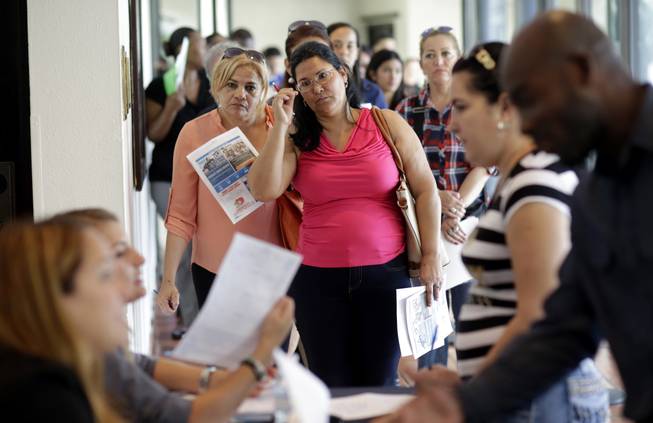
Lynne Sladky / AP
Applicants wait in line at a job fair in Miami Lakes, Fla, in July. A conference on the skills gap in the workforce held last week in Las Vegas emphasized the need for “soft skills,” such as communication and the ability to work in a team.
Wednesday, Oct. 26, 2016 | 2 a.m.
Graduating millennials and retraining baby boomers share little in common, but both could stand to focus on their ability to communicate.
These “soft skills,” as they are often referenced, represent one tool needed in an increasingly diverse set of skills for workers in Nevada’s expanding economy. Local business and education leaders shared that insight among others during a series of in-depth panel discussions entitled “Confronting the Skills Gap: Defining the New Nevada” presented by The Atlantic last week at The Venue Las Vegas.
“We have to find people who can communicate,” said Kristi Overgaard, Switch executive vice president.
As the state continues to expand its business base beyond tourism and gaming, technical skills related to specific fields such as technology and medicine become necessary for those jobs. Yet panel participants repeatedly mentioned the demand for once-basic abilities such as talking to co-workers and functioning well within a team.
“For most of the baby boomers, they lack the soft skills,” said Manny Lamarre, executive director of the Governor’s Office of Workforce Innovation.
Lamarre said employers are hiring for hard skills and firing for soft skills. Communication ability is listed among skills gap issues by the U.S. Department of Labor as well, singling out younger workers as particularly short on them.
“Many new graduates, while tech-savvy, lack basic communication skills and other critical soft skills,” reads the department’s CareerOneStop website.
Job search website Monster.com details soft skills employers are seeking: critical observation, problem solving, adaptability, conflict resolution, teamwork and collaboration, and communication skills.
Many of these abilities define jobs in Nevada’s dominant service industry. The panel addressed how educators and employers are addressing a more STEM-intensive economy and retraining their current employees.
The federal Bureau of Labor Statistics shows that more than 142,000 people work in food and other service in Southern Nevada, accounting for 15.8 percent of the workforce. While most of those positions do not require a college education, they lean heavily on people skills.
“It takes a lot of skills to work in hospitality, especially relationship skills,” said Michelle DiTondo, chief human resources officer with MGM Resorts International.
Yet as high-tech leaders such as Apple and Switch are joined by electric-car companies Tesla and Faraday in establishing Nevada bases, the struggling condition of education in the state again becomes a primary issue.
“There’s an obvious need for more individuals with technical skills,” Lamarre said.
Mike Kazmierski, executive director of the Economic Development Authority of Western Nevada, said during another panel that he does not see a match in the state’s education and its economic needs.
“We’re looking at the jobs, and we’re looking at the graduates and the two don’t match right now,” Kazmierski said.
Switch turns inward for solutions like developing its own micro-universities, but alignment of skills to positions needs to be addressed within Nevada’s education system, panelists said.
Companies in need of skilled workers need that issue to be tackled before the state’s other advantages can come to the fore.
“When you land that Faraday or Hyperloop, it’s easier to recruit people to come to Nevada than it is to other places,” said Jonas Peterson, president of the Las Vegas Global Economic Alliance.

Join the Discussion:
Check this out for a full explanation of our conversion to the LiveFyre commenting system and instructions on how to sign up for an account.
Full comments policy